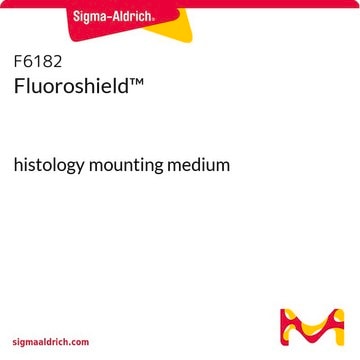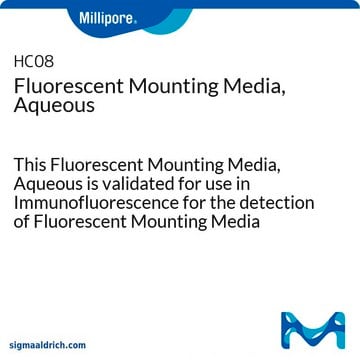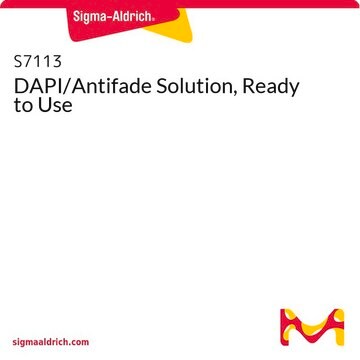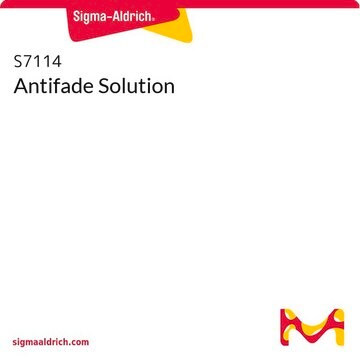F6937
Fluoroshield™ with 1,4-Diazabicyclo[2.2.2]octane
liquid
Sign Into View Organizational & Contract Pricing
All Photos(1)
About This Item
UNSPSC Code:
12171500
NACRES:
NA.47
Recommended Products
product name
Fluoroshield™ with 1,4-Diazabicyclo[2.2.2]octane, pH range 8.0-8.4, Aqueous mounting medium
Quality Level
form
liquid
technique(s)
immunofluorescence: suitable
pH range
8.0-8.4
application(s)
diagnostic assay manufacturing
hematology
histology
storage temp.
2-8°C
General description
Fluoroshield™ with 1,4-Diazabicyclo[2.2.2]octane is an aqueous mounting medium for preserving the fluorescence of tissue and cell smears.
Application
Fluoroshield™ with 1,4-Diazabicyclo[2.2.2]octane prevents rapid photobleaching of FITC, Texas Red®, AMCA, ™ 488, Alexa Fluor 594, Cy® dyes, and tetramethylrhodamine.
Principle
Fluoroshield™ with 1,4-Diazabicyclo[2.2.2]octane mounting medium is fortified with 1,4-Diazabicyclo[2.2.2]octane (a generic version of DABCO®), an anti-fade reagent used to retard photobleaching of fluorescein and other fluorescent dyes.
Legal Information
ALEXA FLUOR is a trademark of Life Technologies
Cy is a registered trademark of Cytiva
DABCO is a registered trademark of Air Products & Chemicals, Inc.
FluoroShield is a trademark of ImmunoBioScience Corp.
Texas Red is a registered trademark of Life Technologies
related product
Product No.
Description
Pricing
Signal Word
Danger
Hazard Statements
Precautionary Statements
Hazard Classifications
Eye Dam. 1
Storage Class Code
12 - Non Combustible Liquids
WGK
WGK 1
Flash Point(F)
Not applicable
Flash Point(C)
Not applicable
Certificates of Analysis (COA)
Search for Certificates of Analysis (COA) by entering the products Lot/Batch Number. Lot and Batch Numbers can be found on a product’s label following the words ‘Lot’ or ‘Batch’.
Already Own This Product?
Find documentation for the products that you have recently purchased in the Document Library.
Customers Also Viewed
Morphological changes of cortical and hippocampal neurons after treatment with VEGF and bevacizumab.
Latzer P, et al.
CNS Neuroscience & Therapeutics, 22(6), 440-450 (2016)
Nour W Al Haj Baddar et al.
Developmental dynamics : an official publication of the American Association of Anatomists, 248(2), 189-196 (2018-12-21)
Among vertebrates, salamanders are unparalleled in their ability to regenerate appendages throughput life. However, little is known about early signals that initiate regeneration in salamanders. Ambystoma mexicanum embryos were administered tail amputations to investigate the timing of reactive oxygen species
Ibtisam A Abbas Al-Darkazly et al.
IEEE journal of translational engineering in health and medicine, 8, 4100113-4100113 (2020-01-31)
Objective: investigation of the extra-low-frequency (ELF) stimulation effect on blood-cell proteins, that causes variation in its electrostatic-state. A hypothesis that this results in the conformational change in the blood-cell proteins which could enhance immune activity is explored. Since HIV-1 and
Mariana L Casalia et al.
Annals of neurology, 82(4), 530-542 (2017-08-24)
A significant proportion of the more than 50 million people worldwide currently suffering with epilepsy are resistant to antiepileptic drugs (AEDs). As an alternative to AEDs, novel therapies based on cell transplantation offer an opportunity for long-lasting modification of epileptic
Anna Wolters et al.
Neural regeneration research, 16(11), 2243-2249 (2021-04-06)
One of the major challenges in emergency medicine is out-of-hospital cardiac arrest (OHCA). Every year, about 53-62/100 000 people worldwide suffer an out-of-hospital cardiac arrest with serious consequences, whereas persistent brain injury is a major cause of morbidity and mortality
Our team of scientists has experience in all areas of research including Life Science, Material Science, Chemical Synthesis, Chromatography, Analytical and many others.
Contact Technical Service







![1,4-Diazabicyclo[2.2.2]octane for synthesis](/deepweb/assets/sigmaaldrich/product/images/488/587/f5a877b3-e573-4686-931f-648015f4d284/640/f5a877b3-e573-4686-931f-648015f4d284.jpg)
![Bis(trimethylaluminum)-1,4-diazabicyclo[2.2.2]octane adduct](/deepweb/assets/sigmaaldrich/product/structures/978/293/6c8c7fbe-4b40-4576-bd40-94ac58cbe057/640/6c8c7fbe-4b40-4576-bd40-94ac58cbe057.png)
![1,4-Diazabicyclo[2.2.2]octane bis(sulfur dioxide) adduct ≥95% (sulfur, elemental analysis)](/deepweb/assets/sigmaaldrich/product/structures/158/739/a9df497b-883d-40f1-ac45-bf699dcee9f9/640/a9df497b-883d-40f1-ac45-bf699dcee9f9.png)

